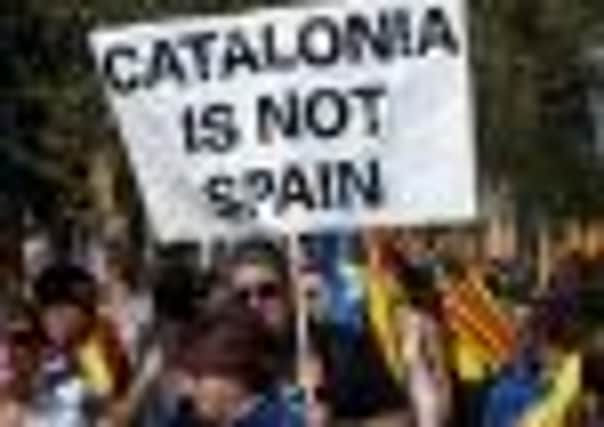Catalonian vote will decide future of Spain


Polls show most Catalans will back pro-independence parties, both of the Left and the Right, handing their leader a mandate to hold a referendum on secession despite strong opposition from the government in Madrid.
The secessionist threat is a major problem for right-of-centre premier Mariano Rajoy who is trying to show stability and fiscal responsibility in his fight to keep Spain in the eurozone and avoid an international bailout, despite a savage recession.
Advertisement
Hide AdAdvertisement
Hide AdCatalan president Artur Mas is expected to win re-election to the Generalitat, the regional assembly in Barcelona, after he converted to the independence cause following a massive pro-secession march in September.
“I hope to be the last president of a Catalonia that the Spanish state is trying to destroy through a dirty campaign,” Mr Mas, who leads the conservative Convergencia i Unio (Convergence and Union party or CiU), declared last weekend. “The next one will not depend on the Spanish state and they will no longer be able to destroy it,” he told a rally. Supporters chanted “independence, independence” back to Mr Mas, who promises to call a referendum on statehood within four years.
Like the Basque country, which also borders France, Catalonia has its own language and cultural identity.
Catalonia’s busy Mediterranean ports, car factories, chemical plants and banks account for a fifth of Spain’s economy. Until recently the region of 7.5 million people was content to push for greater self-governance – such as collecting and spending its own taxes, akin to devo-max – without seeking independence.
But Spain’s recession, with 25 per cent unemployment and drastic public spending cuts, has sharpened a Catalan perception that they are taxed unfairly.
Like the rest of Spain, Catalonia overspent during a decade-long property boom that crashed in 2007 and now it cannot borrow on the markets on its own because its debt has been downgraded to junk. That forced Mr Mas, who as head of the regional government is elected by the assembly rather than directly by voters, to ask Madrid for a €5 billion (£4bn)bailout to meet debt payments.
Even so, Catalans blame their problems on Madrid rather than their own leader. “Madrid is playing with us,” said David Box, 33, a construction worker who supports Mr Mas and independence, taking some time out on a bench on the La Rambla boulevard in the Catalan capital of Barcelona, Spain’s second city. Opinion polls show that between 46 per cent and 57 per cent of Catalans want independence, the highest levels ever.
“We have turned a regular election into a referendum,” said Alfred Bosch, of leftist independence party Esquerra Republicana, which is set to win 18 seats and almost double its presence in the 135-seat Generalitat.
Advertisement
Hide AdAdvertisement
Hide AdMr Rajoy has warned that Catalonia would have to re-apply to join the European Union, while King Juan Carlos has also called for unity. At a weekend campaign rally for his Partido Popular (People’s Party) candidate in Catalonia, Mr Rajoy cautioned voters “not to buy a one-way ticket to nowhere”.
Pro-independence Catalans argue a strong referendum majority for independence would force Spain to change the constitution and the EU would have to respect self-determination.
Some Catalans say they will vote for the CiU to send a message to Madrid and Europe.
“I don’t like how Spain treats us. I am thinking of voting for CiU to support the movement,” said social worker Ofelia Sala, 52, who usually votes for a left-wing party at the polls.